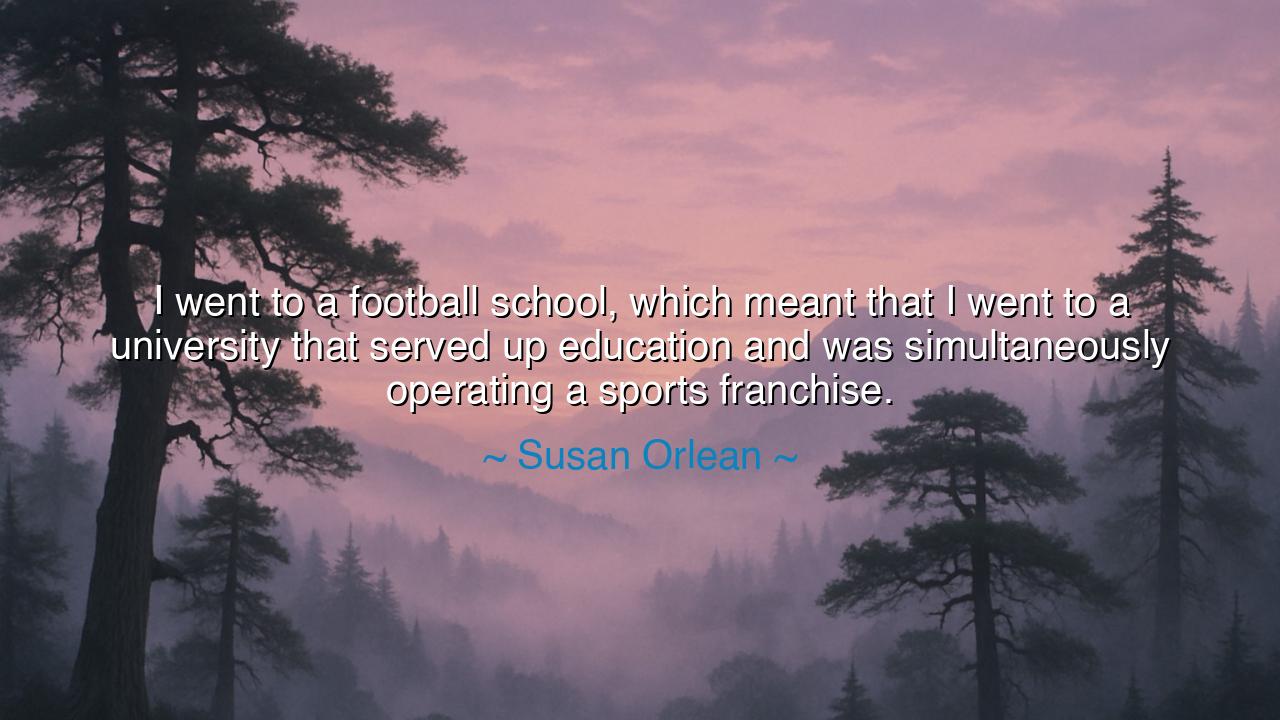
I went to a football school, which meant that I went to a
I went to a football school, which meant that I went to a university that served up education and was simultaneously operating a sports franchise.






“I went to a football school, which meant that I went to a university that served up education and was simultaneously operating a sports franchise.” Thus spoke Susan Orlean, a writer of keen perception and subtle wit, unveiling through irony a truth that lies heavy upon the heart of modern learning. Her words are not merely about football or sport — they are a lament, a reflection, and a warning. For she speaks of a time when education, once the sacred path to enlightenment, began to share its altar with the gods of spectacle and profit. In her voice, we hear the echo of an older wisdom — that when the pursuit of glory overshadows the pursuit of knowledge, the soul of the university begins to wane.
Once, the academy was a sanctuary. In the ancient world, scholars gathered not for gold or victory, but for the love of wisdom — philosophia. Plato and Aristotle taught beneath the open sky, where minds wrestled with eternal questions: What is justice? What is virtue? What is the good life? In those hallowed discussions, there was no scoreboard, no cheer of the crowd — only the sound of reason and revelation. Learning was the discipline of the spirit, not the entertainment of the masses. But as centuries passed, the temples of wisdom became entwined with the passions of the marketplace, and the sacred fire of thought began to flicker beneath the bright lights of competition.
Susan Orlean’s “football school” stands as a symbol of this transformation. The university, she observes, had become two institutions in one — half a place of study, half a theater of sport. Knowledge was served, yes, but alongside the feast of games and profit, of jerseys and ticket sales. It is not that sport itself is evil — for in its purest form, sport teaches discipline, teamwork, and courage. Yet when the franchise overtakes the education, when the roar of the stadium drowns out the whisper of thought, something essential is lost. The heart of learning grows faint beneath the weight of applause.
History, too, bears witness to this conflict between learning and spectacle. In ancient Rome, while philosophers and poets still spoke of virtue, the people flocked to the Colosseum to see blood and glory. The rulers, knowing the hunger of the crowd, gave them “bread and circuses,” and in doing so, lulled a once-great civilization into decline. The stadiums were full, but the libraries grew empty. Rome forgot its mind and thus lost its soul. So too must we beware when our own centers of knowledge begin to mirror that ancient decay — when our universities become corporations, when our teachers become marketers, when our students become customers instead of seekers.
Yet Orlean’s quote is not mere condemnation — it is a mirror. She calls upon us to see clearly the paradox of our time: that a nation may praise education while feeding most of its passion to entertainment; that we celebrate scholarship, yet idolize victory; that the same hands that hold books also wave banners in the stands. This duality, she suggests, is the spirit of our age — brilliant, distracted, and divided. But within that contradiction lies a choice: whether we will let our schools be mere franchises, or reclaim them as sanctuaries of the mind and spirit.
Consider the example of Robert Hutchins, former president of the University of Chicago. In the 1930s, he faced the same tension Orlean describes. The university’s football program was famous, its stadium filled with cheering fans. Yet Hutchins saw that the obsession with victory had begun to corrode the school’s purpose. So he did the unthinkable — he abolished the football team entirely. “The object of education,” he said, “is to prepare the young to educate themselves throughout their lives.” His decision was met with outrage, yet in time, it was recognized as an act of integrity. He chose the mind over the marketplace, and through that choice, restored the dignity of the institution he led.
So, my child, take this lesson to heart: education is not a spectacle. It is a journey inward, a labor of thought and spirit. The world will tempt you with applause, with speed, with victory — but wisdom grows only in silence and struggle. Enjoy the game, but never forget the purpose of the field upon which your mind plays. Support your team, but build your soul. Let not the lights of entertainment blind you to the deeper light of understanding.
For in the end, as Orlean’s words remind us, every university, every society, and every person must choose what they truly serve: the education of the mind, or the franchise of the crowd. One builds nations that think; the other builds empires that fade. Choose the first, and your learning will endure long after the roar of the stadium has fallen silent.






AAdministratorAdministrator
Welcome, honored guests. Please leave a comment, we will respond soon